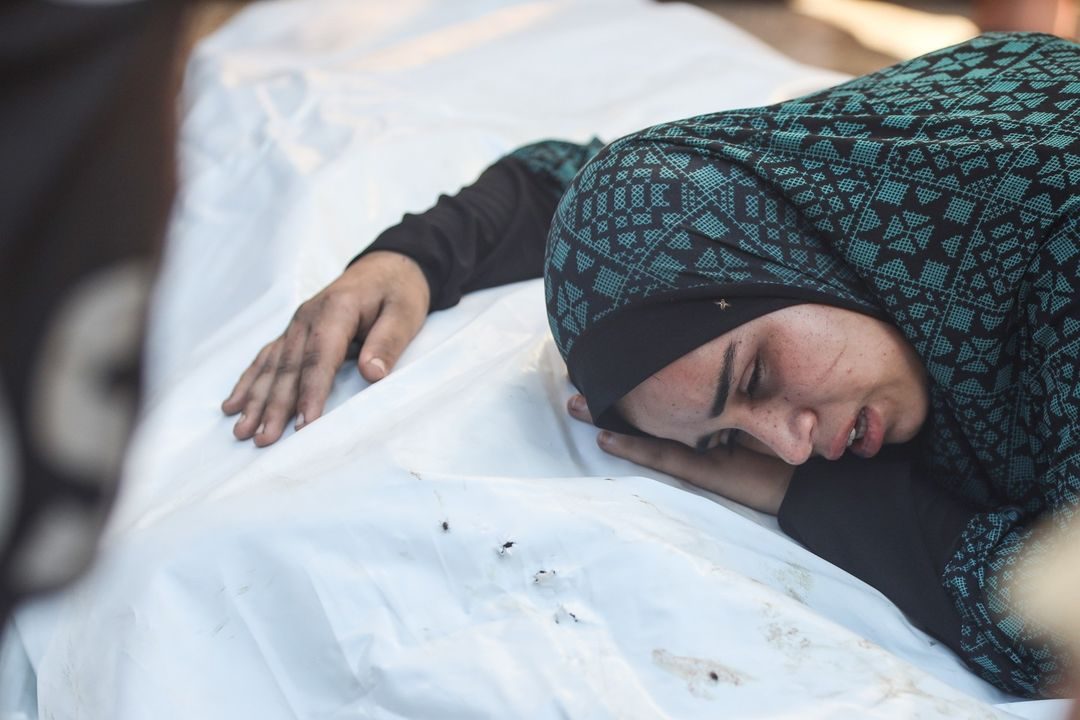Indirect negotiations between Israel and Hamas are scheduled to resume on Thursday in Doha or Cairo following a joint statement released by Qatar’s Amir Sheikh Tamim bin Hamad Al-Thani, U.S. President Joe Biden and Egyptian President Abdel Fattah El-Sisi.
Qatar has “strongly” condemned Israel’s “horrific massacre” at a school-turned shelter in Gaza city on Saturday, where the occupation killed more than 100 Palestinians during Fajr prayers.
In a statement on Saturday, Qatar’s foreign ministry slammed the attack as “a brutal crime against defenceless civilians.”
Qatar, a central mediator between Israel and Hamas, noted that the massacre represented “a flagrant infringement of the fundamental precepts of international humanitarian law.”
The Gulf state has also reiterated its call for “an urgent international investigation” into the targeting of schools and shelters in the Gaza Strip, calling on the international community to fully protect displaced people.
“Qatar reiterates its call for conducting an urgent international investigation by dispatching independent UN investigators to probe the ongoing targeting by Israeli occupation forces of schools and shelters for displaced people,” the statement added, calling on the Israeli “occupation to abide by international law.”
Israel carried out the massacre on the al-Tabin school in the Daraj neighbourhood of Gaza City, where continuously displaced families were sheltering.
The massacre raised the death toll in the Gaza Strip to at least 39,790, with 1.9 million people out of the 2.1 million population displaced by Israel’s brutal onslaught since October 7.
The Israeli military was quick to justify the attack, alleging that it had “received clear intelligence” regarding the presence of Hamas fighters on the ground, claiming no women or children were present, despite them being the majority of the victims.
“After we received clear intelligence of the threat posed by these terrorists, and in accordance with international humanitarian law, we took numerous steps to mitigate the risk to civilians. The IDF conducted a precision strike against the terrorists in one specific building of the compound,” Daniel Hagari, the Israeli occupation forces’ spokesperson said.
The Israeli occupation forces also released a list alleging 19 members of the Palestinian resistance were killed during the attack.
Hamas dismissed the Israeli allegations, noting that all of the victims of the massacre were civilians who were performing the Fajr prayers.
“The Daraj neighbourhood massacre is among the thousands of massacres committed by the criminal Nazi occupation in the Gaza Strip, which intentionally and deliberately targeted defenseless civilians,” Hamas said in a statement.
“The occupation deliberately spreads such lies after every massacre it carries out to justify its heinous crimes, and this is what has become clear to every observer,” it added.
The attack was met with global condemnation from Egypt, Türkiye, the United Arab Emirates, France, Iran, Afghanistan, Kuwait, Bahrain among others.
The United States said it was “deeply concerned” over the attack while failing to condemn its ally, Israel.
“We are deeply concerned about reports of civilian casualties in Gaza following a strike by the Israel Defence Forces on a compound that included a school,” the White House said in a statement.
“We know Hamas has been using schools as locations to gather and operate out of, but we have also said repeatedly and consistently that Israel must take measures to minimise civilian harm,” it added.
The U.S. has been Israel’s main military backer throughout the war in the Gaza Strip, as per numerous investigations, including one by Amnesty International.
On Friday, a U.S. State Department official told the press that Washington is set to provide Tel Aviv with $3.5bn in military spending. CNN first broke the story over the weekend, saying the military aid was part of a $14.1bn supplemental funding bill that Congress had issued Israel in April.
Stalled talks to resume Thursday
Meanwhile, indirect negotiations between Israel and Hamas are scheduled to resume on Thursday in Doha or Cairo following a joint statement released by Qatar’s Amir Sheikh Tamim bin Hamad Al-Thani, U.S. President Joe Biden and Egyptian President Abdel Fattah El-Sisi.
The statement on August 8 by the mediators said “the time has come to conclude the ceasefire and hostages and detainees release deal”, noting that the talks would bridge the remaining gaps to reach an agreement.
“There is no further time to waste nor excuses from any party for further delay. It is time to release the hostages, begin the ceasefire, and implement this agreement”, the joint statement said.
The talks would build on a proposal drafted by Biden on May 31 that was approved by the UN Security Council following a majority vote.
The three-stage proposal would pave the way for a complete ceasefire in the Gaza Strip and the withdrawal of Israeli forces.
During the first phase, a six-week ceasefire would take place to enable the release of Israeli captives held by Hamas, including the remains of those killed, as well as Palestinian prisoners in Israeli jails.
Negotiations would take place throughout the first six weeks and Israeli forces would withdraw from populated areas in the Gaza Strip. The same phase would allow Palestinian civilians to return to their homes and enable the “safe and effective distribution of humanitarian assistance”.
The second phase would result in “a permanent end to hostilities” in exchange for the release of all other captives in Gaza and the full withdrawal of Israeli forces.
By the third phase, a “multi-year reconstruction plan for Gaza” would begin and the remains of all other captives would be returned to their families.
On June 12, U.S. Secretary of State Antony Blinken told the press in Doha that Hamas had presented “additional amendments” to its proposal, noting that some were feasible while others were not.
Hamas denied Washington’s claims and stressed that it “has dealt positively” with all stages of the negotiations while Israeli Prime Minister Benjamin Netanyahu blocked all efforts to end the war.
The Palestinian group described Blinken’s remarks at the time as an attempt to “exonerate” Israel as part of its “policy of complicity in the brutal war of extermination” of Palestinians.







